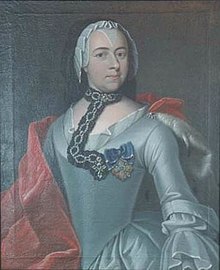Caroline of Erbach-Fürstenau
| Caroline of Erbach-Fürstenau | |||||
|---|---|---|---|---|---|
| Duchess of Saxe-Hildburghausen | |||||
 |
|||||
| Tenure | 19 June 1726 – 13 August 1745 | ||||
| Born |
29 September 1700 Fürstenau Castle, Michelstadt |
||||
| Died | 7 May 1758 (aged 57) Hildburghausen |
||||
| Spouse | Ernest Frederick II, Duke of Saxe-Hildburghausen | ||||
| Issue |
Ernest Frederick III Prince Eugene Prince Albert Princess Amalie of Hohenlohe-Neuenstein |
||||
|
|||||
| House | House of Erbach | ||||
| Father | Philipp Charles, Count of Erbach-Fürstenau | ||||
| Mother | Charlotte Amalie of Kunowitz | ||||
| Religion | Lutheranism | ||||
| Full name | |
|---|---|
| Caroline Amalie |
Countess Caroline Amalie of Erbach-Fürstenau (born: 29 September 1700 at Fürstenau Castle, Michelstadt – died: 7 May 1758 in Hildburghausen), was a countess of Erbach-Furstenau and by marriage Duchess of Saxe-Hildburghausen. From 1745 to 1748, she was also Regent of Saxe-Hildburghausen.
Caroline was a daughter of Count Philipp Charles of Erbach-Fürstenau and Michelstadt (1677–1736), who was also Lord of Breuberg, and his first wife Countess Charlotte Amalie of Kunowitz (1677–1722).
She married on 19 June 1726 at Fürstenau Castle Duke Ernest Frederick II of Saxe-Hildburghausen. The couple lived first in Königsberg in Bayern where the Hereditary Prince Charles Frederick Ernest was born. In 1730 Ernest Frederick built a pleasure palace for his wife, which he called Caroline Castle. In 1744 he also expanded Eisfeld castle, which had been reserved as a Wittum for Caroline.
After the death of her husband in 1745 she ruled as regent for her minor son Charles Frederick Ernest. In a decree of 1746, she took measures against the "wandering gypsies and begging people", in which even the death penalty was possible. She restructured the Code of Criminal Procedure and banned the sale of a fief, allodial title or real estate without authorization by the sovereign. In a case before the High Court in which the Duchy of Saxe-Meiningen demanded the district of Sonnefeld, which lasted from 1743 to 1752, she was represented by the secret Privy Councillor Johann Sebastian Kobe von Koppenfels, who helped her win the case.
...
Wikipedia
